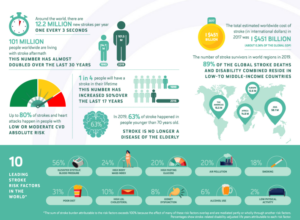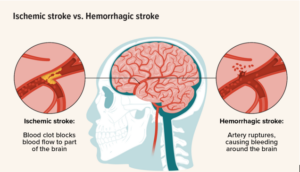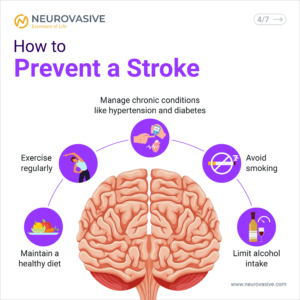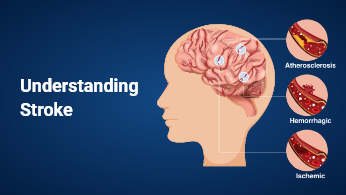Introduction
Ravi had always enjoyed the good things in life. He loved his fast food, enjoyed a smoke after a meal, and rarely found the time to exercise. It wasn’t that he didn’t care about his health; he just felt invincible. But one morning, Ravi experienced something terrifying. He woke up with a severe headache, struggled to lift his left arm, and his speech became slurred. Panic set in as he realized something was terribly wrong. A trip to the hospital confirmed his worst fears: Ravi had suffered a stroke.
Strokes are not as uncommon as we might think. In fact, they are the second leading cause of death globally, claiming over 6 million lives each year. What’s even more alarming is that many strokes are preventable. Poor lifestyle choices, like those Ravi made, can significantly increase the risk. But just as importantly, positive lifestyle changes can drastically reduce this risk.
What if Ravi had chosen differently? What if he had paid more attention to his diet, exercised regularly, and avoided smoking and excessive alcohol? How many lives could be saved if more people made healthier choices? The power to reduce stroke risk is in our hands, and it starts with understanding the impact of our daily habits.

Understanding Stroke
A stroke occurs when blood flow to the brain is interrupted, causing brain cells to die. There are two main types of stroke:
- Ischemic Stroke: Caused by a blockage in a blood vessel supplying the brain.
- Hemorrhagic Stroke: Caused by bleeding in or around the brain.
Common symptoms of a stroke include sudden numbness or weakness, confusion, trouble speaking, vision problems, dizziness, and a severe headache. Recognizing these warning signs and seeking immediate medical attention can save lives.

Impact of Lifestyle Choices on Stroke Risk
-
Diet and Nutrition
Poor diet is a major risk factor for stroke. Consuming excessive salt, sugar, and saturated fats can lead to high blood pressure, diabetes, and obesity, all of which increase stroke risk. On the other hand, a balanced diet rich in fruits, vegetables, whole grains, and lean proteins can promote cardiovascular health and reduce stroke risk.
-
Physical Activity
Regular physical activity is crucial for maintaining cardiovascular health. Inactivity can lead to weight gain, high blood pressure, and diabetes, increasing the likelihood of a stroke. Aim for at least 30 minutes of moderate exercise most days of the week, such as brisk walking, jogging, swimming, or cycling.
-
Smoking and Alcohol Consumption
Smoking damages blood vessels and significantly increases stroke risk. Quitting smoking can drastically reduce this risk. Excessive alcohol consumption also raises stroke risk, so moderation is key – no more than one drink per day for women and two for men.
-
Weight Management
Maintaining a healthy weight reduces the likelihood of developing hypertension and diabetes, both of which are significant stroke risk factors. Healthy eating and regular exercise are essential for weight management.
-
Stress Management
Chronic stress can contribute to stroke risk. Activities like mindfulness, yoga, and engaging in hobbies can help reduce stress levels and improve overall well-being.
Preventive Measures and Healthy Habits
Incorporating healthy habits into daily routines can significantly reduce stroke risk. Here are some practical tips:
- Diet and Nutrition: Eat a balanced diet with plenty of fruits, vegetables, whole grains, and lean proteins. Avoid excessive salt, sugar, and saturated fats.
- Physical Activity: Engage in regular exercise. Aim for at least 30 minutes of moderate activity most days of the week.
- Smoking and Alcohol: Quit smoking and drink alcohol in moderation.
- Weight Management: Maintain a healthy weight through diet and exercise.
- Stress Management: Practice stress-reducing activities like mindfulness, yoga, and hobbies.

Other Factors Influencing Stroke Risk
- Hypertension
High blood pressure is a leading risk factor for stroke. Managing blood pressure through diet, exercise, and medication is crucial.
- Diabetes Management
Diabetes increases stroke risk. Managing blood sugar levels through a balanced diet, regular exercise, and medication is essential.
- Sleep
Adequate sleep is vital for overall health. Sleep disorders like sleep apnea can increase stroke risk, so addressing sleep issues is important.
- Personal Stories and Testimonials
Stories of individuals who have reduced their stroke risk through lifestyle changes can inspire and motivate others. These success stories demonstrate the positive impact of healthy choices.
Conclusion
Making positive lifestyle changes can significantly reduce stroke risk. By adopting a balanced diet, regular exercise, avoiding smoking and excessive alcohol, managing weight, reducing stress, controlling hypertension and diabetes, and ensuring adequate sleep, we can protect our brain health.
Call to Action
Are you ready to make changes that can safeguard your health and reduce your stroke risk? Share this blog with others who might benefit and schedule a consultation with your healthcare provider to discuss personalized stroke prevention strategies. Remember, small steps today can lead to a healthier tomorrow.












Leave a comment